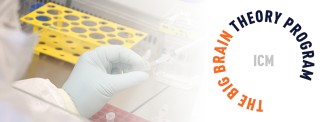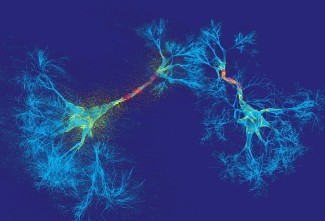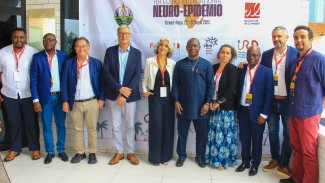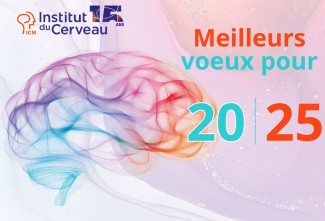The "Big Brain Theory" program is a call for projects launched by the Institut du Cerveau - ICM and the IHU-A-Institut du Cerveau - ICM to finance risky innovative, interdisciplinary projects proposed by teams of the Institute. It is aimed at Institut du Cerveau - ICM researchers, clinicians and the personnel of the technological platforms, as well as those of the Nervous System Diseases Pole of the Pitié-Salpêtrière Hospital.
For
Alexis Brice, Director General of the Institut du Cerveau - ICM, "this project is first of all an opportunity for researchers to finance an original project, involving a risk, without the need for preliminary data. For the Institute, it's also an important call, because of its structural value: we hope to see emerge transversal projects requiring complementary competencies within the Institut du Cerveau - ICM, in order to profit as much as possible from the diversity of our research community. The added value of the Institut du Cerveau - ICM comes its capacity to ally different forms of expertise and approaches (basic research, clinic, etc.), fostering the exploration of new frontiers and interfaces. Researchers in the Institute can thus create synergies and go further than if they were isolated. This confirms the interest of the Institut du Cerveau - ICM model."
Between January 2016 and June 2017, ten projects selected by the International Scientific Advisory Board of the Institut du Cerveau - ICM and the IHU-A-Institut du Cerveau - ICM will receive a maximum of 200000 euros each. After this, one to three of these projects, which will have obtained proof of concept, will be able to continue their work with financing of up to a million euros.
For Bertrand Fontaine, Director General of the IHU-A-Institut du Cerveau - ICM, an Institute founded by INSERM, the CNRS, the AP-HP, the Institut du Cerveau - ICM and IFRAD, "it's an innovative call for projects because it aims at financing projects entailing risk, an original idea and collaborations among several Institut du Cerveau - ICM teams. The most important thing is the idea: the researchers are asked to have a transformational idea. Another innovative aspect of this call is its administrative simplicity. Today's researchers have many administrative duties, which interfere with their research. With the "Big Brain Theory" program, researchers will be completely financed so that they can invest themselves completely in their research. The selection of projects is based on three criteria: originality, risk and transversality. One expects ideas that will do away with technological or theoretical obstacles to the understanding of the brain and spinal cord. Today, the Institut du Cerveau - ICM has reached a phase in its history in which the research teams and platforms exist, linked by the IHU-Institut du Cerveau - ICM to teams of the hospital. The infrastructures are now of a high level, it is thus time to foster the emergence of ambitious research projects."
This project is, in fact, of the greatest importance for the technological development of the Institut du Cerveau - ICM, but also for the hospital community that cares for patients with nervous system diseases.
Alexis Brice recalls that the "Institute has invested a great deal in its personnel and its equipment in order to offer researchers first order technology platforms. Technologies evolve continually, and the quality of available tools confers a competitive advantage. For these reasons, the equipment of the Institut du Cerveau - ICM must be freely accessible and used most advantageously. This requires a policy of technological development, and one aspect of this policy is precisely in this call for projects, because it is open to the platforms. The projects developed in the framework of the "Big Brain Theory" program can be scientific, technological or methodological. This illustrates the will of the Institut du Cerveau - ICM to evolve continually, so that its researchers always have access to the most advanced technologies."







